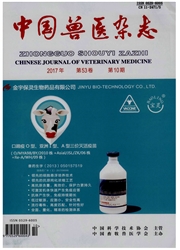

 中文摘要:
中文摘要:
兽药吸收进入动物机体后,少部分药物将残留于动物组织细胞内,而大部分药物将排泄出体外,最终进入生态环境中,且可能造成环境污染。为了了解恩诺沙星在环境中残留对土壤细菌耐药性的影响,本试验采用琼脂稀释法对土壤细菌进行了抗菌药物敏感性试验。结果表明,恩诺沙星对用药前分离的土壤优势细菌的MIC值都比较低,为0.008-2μg/mL,对其中大多数细菌的MIC值为0.032-0.125μg/mL;用药后分离的土壤细菌对恩诺沙星的敏感性降低,细菌对恩诺沙星的耐药率和耐药水平随土壤中药物浓度加大和时间的延长而明显增高。
 英文摘要:
英文摘要:
It has been known that part of their parents and metabolites of veterinary drugs will be remained in animal tissues, but most of them are excreted out from the animal body and enter into soil which may bring about environmental problems when the drugs are absorbed and transferred throughout the body. The antimicrobial susceptibilities of soil bacteria were examined by the agar dilution method before and after the enrofloxacin (ENR) was added to soils to study the effect of ENR on soil bacteria. The resuits showed that the minimum inhibitory concentration (MIC) of the dominant bacteria were 0. 008 - 2 μg/mL, and most of them were 0. 032-0. 125 μg/mL before the ENR was added to the soil. However, most of the bacteria manifested the different degrees of resistance to ENR after it was added to the soil. The growth rate and resistant degree of ENR-resistant bacteria were enhanced with the increase of ENR concentrations in soil and treatment time.
 同期刊论文项目
同期刊论文项目
 同项目期刊论文
同项目期刊论文
 期刊信息
期刊信息
